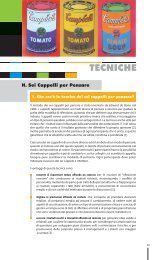Creativity Theory - TRaining MAterial in Creativity and InnovaTion ...
Creativity Theory - TRaining MAterial in Creativity and InnovaTion ...
Creativity Theory - TRaining MAterial in Creativity and InnovaTion ...
Create successful ePaper yourself
Turn your PDF publications into a flip-book with our unique Google optimized e-Paper software.
38<br />
B. SUCCESS FACTORS<br />
form a task <strong>in</strong> a controlled <strong>and</strong> constra<strong>in</strong>ed<br />
way is reduced <strong>in</strong> his autonomy.<br />
More recent research supports the view of<br />
a positive effect of extr<strong>in</strong>sic motivation. If<br />
people – while motivated by external factors<br />
– feel controlled <strong>and</strong> evaluated then<br />
the effect on creativity will be detrimental<br />
(non-synergistic extr<strong>in</strong>sic motivators).<br />
On the contrary, if external factors are<br />
perceived as useful <strong>in</strong>formation <strong>and</strong> constructive<br />
feedback that enable the person<br />
to better perform their task they will act <strong>in</strong><br />
concert with <strong>in</strong>tr<strong>in</strong>sic motives <strong>and</strong> have a<br />
positive effect on creativity (synergistic<br />
extr<strong>in</strong>sic motivators).<br />
Let us briefly expla<strong>in</strong> the factors of curiosity<br />
<strong>and</strong> fear as drivers for creativity. When<br />
people are motivated, they are moved to<br />
action, <strong>and</strong> the next step is to beg<strong>in</strong> the<br />
search for possibly useful <strong>in</strong>formation.<br />
This search is based on curiosity whereby<br />
people explore the unknown possibilities<br />
that motivation makes manifest. Curiosity<br />
is an aspect of the search of knowledge<br />
<strong>and</strong> sense. It leads people to experiment<br />
with their environment; it leads people<br />
to unplanned discoveries. These discoveries,<br />
<strong>and</strong> particularly the journeys through<br />
the unknown that lead to them, are often<br />
fearful experiences. However, they can also<br />
be surpris<strong>in</strong>gly enterta<strong>in</strong><strong>in</strong>g. In both cases,<br />
they give people experience on which to<br />
draw <strong>in</strong> order to help underst<strong>and</strong> new<br />
circumstances.<br />
Curiosity, when exercised <strong>in</strong> a safe environment,<br />
transforms the unknown from<br />
someth<strong>in</strong>g potentially dangerous <strong>in</strong>to<br />
someth<strong>in</strong>g manageable <strong>and</strong> perhaps <strong>in</strong>terest<strong>in</strong>g<br />
or even beneficial.<br />
However, the search for unimag<strong>in</strong>ed<br />
knowledge through new experiences can<br />
be frighten<strong>in</strong>g. For some people a little bit<br />
of <strong>in</strong>itial fear can change to powerful fear.<br />
An unmanaged fear can escalate to the<br />
po<strong>in</strong>t where it triggers a primitive “fight-orflight”<br />
response that focuses th<strong>in</strong>k<strong>in</strong>g <strong>and</strong><br />
behavior purely on survival. If sufficiently<br />
frightened, people can lose most of their<br />
capacity for creative curiosity. This is why<br />
employees faced with new but potentially<br />
risky tasks often avoid beg<strong>in</strong>n<strong>in</strong>g them. At<br />
a deeper level, each person has a different<br />
tolerance for risk. To some extent risk<br />
tolerance is determ<strong>in</strong>ed by the motivation<br />
<strong>in</strong>volved. Intr<strong>in</strong>sically motivated people are<br />
able to tolerate greater risk <strong>and</strong> more fear.<br />
The solution, accord<strong>in</strong>g to McGhee, lies <strong>in</strong><br />
such strong <strong>in</strong>tr<strong>in</strong>sic belief <strong>in</strong> the work that<br />
you can commit yourself beyond the po<strong>in</strong>t<br />
of possible discouragement.<br />
A leader can play an important role <strong>in</strong> stimulat<strong>in</strong>g<br />
curiosity, lower<strong>in</strong>g fear by offer<strong>in</strong>g<br />
a secure work<strong>in</strong>g environment, nurtur<strong>in</strong>g<br />
motivation of employees <strong>and</strong> f<strong>in</strong>ally support<strong>in</strong>g<br />
<strong>and</strong> reward<strong>in</strong>g good ideas.<br />
Education <strong>and</strong> tra<strong>in</strong><strong>in</strong>g is fundamental <strong>in</strong><br />
nurtur<strong>in</strong>g creativity. Education <strong>and</strong> tra<strong>in</strong><strong>in</strong>g<br />
can act as a catalyst or as a barrier to creativity<br />
[23]. In the last several decades many<br />
of the world’s most developed countries<br />
have shifted from an <strong>in</strong>dustrial economy to<br />
a knowledge economy, one based on the<br />
creation of knowledge, <strong>in</strong>formation <strong>and</strong> <strong>in</strong>novation.<br />
However, too little attention has<br />
been paid to the implications of this economic<br />
shift, <strong>in</strong> particular with respect to<br />
the educational system. Most contemporary<br />
schools <strong>and</strong> educational systems are<br />
still designed to meet the economic needs<br />
of the <strong>in</strong>dustrial economy <strong>and</strong> so they<br />
have become somewhat obsolete. Hence,<br />
it becomes more important to adapt the<br />
teach<strong>in</strong>g <strong>and</strong> learn<strong>in</strong>g methods to the<br />
needs of the knowledge society. In the<br />
60’s Torrance had already argued that the<br />
teacher-pupil relationship must be bent<br />
toward creativity; it should not be based<br />
on a “stimulus-response” situation but on<br />
a liv<strong>in</strong>g relationship, a co-experienc<strong>in</strong>g.<br />
Moreover, Torrance claimed that certa<strong>in</strong><br />
cultural traits are detrimental to creativity<br />
<strong>and</strong> must be avoided, i.e.<br />
- treat divergence with abnormality,<br />
- the exclusive orientation on success<br />
rather than on achievement for its<br />
own sake,<br />
- the emphasis on immediate action<br />
<strong>and</strong> short term goals,<br />
- work <strong>and</strong> play should not be<br />
considered anti-ethical<br />
There is a relatively recent acknowledgement<br />
that the <strong>in</strong>novative economy is<br />
not based on a few brilliant <strong>and</strong> creative<br />
<strong>in</strong>ventors or entrepreneurs <strong>and</strong> so <strong>in</strong>nova-



